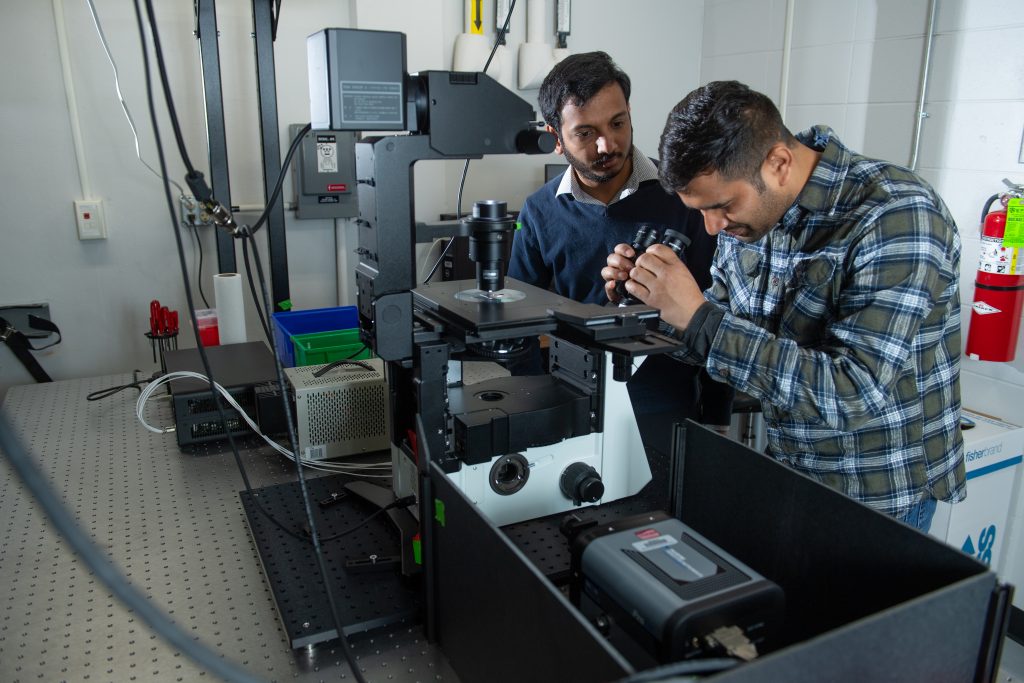
Vignesh Sundaresan (left), assistant professor of chemistry and biochemistry at the University of Mississippi, and graduate student Shubhendra Shukla, of India, will travel to Texas A&M to study with Lane Baker, an electrochemist who specializes in scanning probe techniques, as a part of Sundaresan’s recent grant. Photo by Kevin Bain/Ole Miss Digital Imaging Services
Chemistry professor, student study ways to make clean energy available to all
By Clara Turnage
To create clean energy sources that are affordable and easy to replicate, researchers must first figure out how to efficiently create hydrogen. That is the process University of Mississippi professor Vignesh Sundaresan hopes to improve in his upcoming research.
The National Science Foundation has awarded Sundaresan, assistant professor of chemistry and biochemistry, $244,000 in an Established Program to Stimulate Competitive Research grant for a partnership with Lane Baker, a Texas A&M electrochemist who specializes in scanning probe techniques.
The collaboration’s aim is to study electrocatalyst testing methods in hopes of creating more reliable hydrogen production for use in fuel cell-based vehicles and other clean energy-powered devices.
“To make clean hydrogen, we need the tools to determine what works best,” Sundaresan said. “We must be able to measure the efficiency and stability of hydrogen-producing catalysts. That’s the goal of this project.”
Fuel cell-based vehicles are similar to electric vehicles in that they do not use fossil fuels. However, they do not rely on lithium, a rare mineral that is a necessary component in the batteries for electric vehicles. Fuel cell-based vehicles emit only water vapor, making them a clean mode of transportation.
The problem? Hydrogen production is costly and only California and Hawaii have hydrogen refueling stations, making widespread use of fuel cell vehicles difficult.
The creation of hydrogen relies largely on electrocatalysts, substances that speed up chemical reactions, Sundaresan said. The current testing method for electrocatalysts does not give a nuanced view of each particle’s reaction, making production of chemicals such as hydrogen less precise.
Sundaresan and his Ole Miss team hope to design an electrochemical-optical microscope that can test electrocatalysts at the particle level and give scientists a deeper understanding of which catalysts produce hydrogen best.
“We can see the need of moving from fossil fuel-based energy to clean energy sources,” said Shubhendra Shukla, a second-year doctoral chemistry student from Gonda, India. “We have to find other sources that are clean and environmentally friendly. Hydrogen is one of these.
“We need to focus on how to produce hydrogen so we can be less dependent on other forms of energy.”
Sundaresan and Shukla will live in College Station for roughly six months over two summers as they work with Baker, and the grant will also fund a summer research program for K-12 students, where Sundaresan said he hopes to encourage students’ interest in STEM.
“We’re going to be working with Coffeeville High School to boost STEM learning for students there,” he said. “We want to use this research as a bridge to encourage the K-12 students in our community, and we hope to see more Mississippi-based students here at Ole Miss in STEM.”
This research is supported by the National Science Foundation grant no. 2327025.



